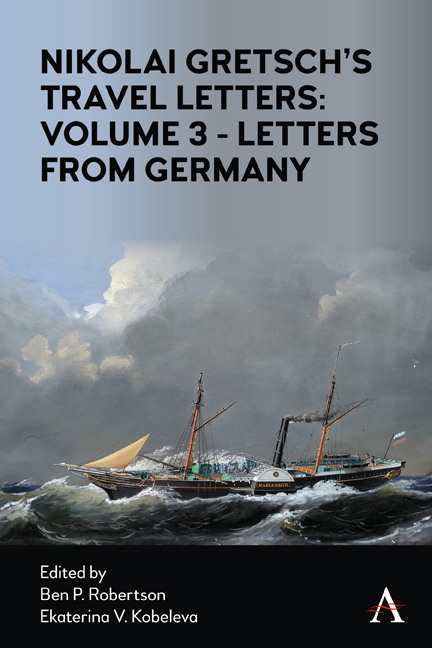Book contents
- Frontmatter
- Contents
- List of Illustrations
- Abbreviations
- Miscellaneous Frontmatter
- Introduction to Volume 3
- Letter XXXI
- Letter XXXII
- Letter XXXIII
- Letter XXXIV
- Letter XXXV
- Letter XXXVI
- Letter XXXVII
- Letter XXXVIII
- Letter XXXIX
- Letter XL
- Letter XLI
- Notes on this Translation
- Selected Bibliography
- Index
Letter XXXII
Published online by Cambridge University Press: 22 October 2021
- Frontmatter
- Contents
- List of Illustrations
- Abbreviations
- Miscellaneous Frontmatter
- Introduction to Volume 3
- Letter XXXI
- Letter XXXII
- Letter XXXIII
- Letter XXXIV
- Letter XXXV
- Letter XXXVI
- Letter XXXVII
- Letter XXXVIII
- Letter XXXIX
- Letter XL
- Letter XLI
- Notes on this Translation
- Selected Bibliography
- Index
Summary
Departure from Prague. The Bohemian Forest. Bavaria. Passports. Regensburg. The cathedral. The bridge. Public promenades. Monuments. Reminiscences. The palace of Prince von Thurn-und-Taxis. Valhalla. Departure to Munich.
On the 21st of August, at six o’clock in the afternoon, I departed from Prague. My kind friend Hanka saw me off to the diligence, and when the equipage started out from the post yard, he went through the side-street to the main street and waved good-bye to me one more time from afar. I had arranged a seat in the cabriolet, or coupé, but when I got into the diligence, I saw my mistake. The cabriolets here are different from those in which I rode across France, Prussian domains, and other countries of Germany: These lack window glass, but have only leather flaps, which poorly shield from the rain and do not protect from cold at all. In Prague, on the advice of my friends, I provided myself with a warm cap, a warm camisole, etc.; but it was not enough, and I paid for my imprudence with the bad cold. The part of Bohemia we traveled through does not present any captivating or picturesque views: There are hillocks and mountains, but they are unattractive, prosaic. The Bohemian Forest (Böhmerwald), a large, quite high, but not steep mountain range, lies at the border. On the road between Pilsen and Beroun, the conductor pointed out the nearby village of Ratzau, which is famous for one of its inhabitants. A simple, illiterate peasant discovered the means to cure fractures of legs, arms, and so on. He rubs the fractured place with an ointment, which he composes himself from different herbs; then he bandages the wound in a special way, and the fracture very soon heals without leaving any trace. He not only cures recent fractures, but repairs poorly healed ones after breaking the bone again. The injured flock to him from afar.
The next day was Sunday. When we passed through a small town called Teinitz, the people were walking from church, and I could see the Sunday attire of the local villagers. The men were dressed in long, clumsy caftans, with high waists, embroidered on the backs with multicolored silk; each one had a staff in his hand.
- Type
- Chapter
- Information
- Publisher: Anthem PressPrint publication year: 2021

